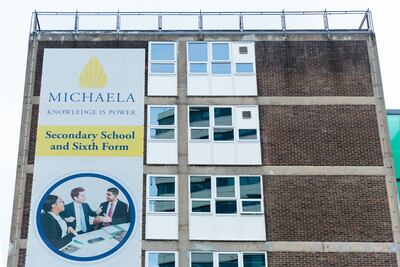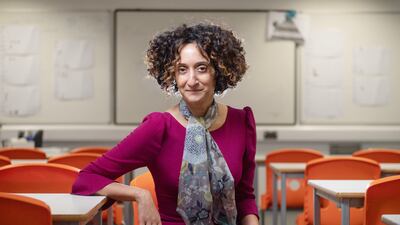A high-rated London school is being sued by a Muslim pupil over its decision to impose a strict policy of banning prayer rituals.
The Michaela Community School is run by Katharine Birbalsingh, who has been dubbed “Britain’s strictest head teacher” and is also a UK government adviser on social mobility.
Its lawyers allege the school, in Wembley, North London, has been subject to an online campaign amid allegations it is anti-Islam, with police called to respond to claims bombs had been planted there, forcing it to hire security guards.
But after arguments by the media, judge Thomas Linden ruled that the court hearing should be held in public and the school and head teacher can be identified.
The pupil, who cannot be identified, alleges that the school's policy is discriminatory and has “fundamentally changed” how she feels “about being a Muslim in this country”.
At a hearing on Tuesday, the pupil described the ban as “like somebody saying they don't feel like I properly belong here”.
Sarah Hannett KC, representing the pupil, told the court that the policy had the “practical effect of only preventing Muslims from praying, because their prayer by nature has a ritualised nature, rather than being internal”.
In her case against the school's governing body, the Michaela Community Schools Trust, the pupil claims the decision “banning prayer rituals” also breaches her right to freedom of religion.
Ms Hannett said the ban at the school, where about half of the 700 students are Muslim, makes the pupil “feel guilty and unhappy, in her words, it 'messes up her day'”.
In March last year, about 30 students began praying in the school's “wet” and “dirty” yard, using blazers to kneel as they were not permitted to bring in prayer mats, Ms Hannett told the court.
In post on social media, Ms Birbalsingh said: “We all make sacrifices so that we can all live in harmony.” Complaints by Christian and Hindu parents about the ban were not acted on, she added.
“We believe it is wrong to separate children according to religion or race, and that it is our duty to protect our children and provide them with an environment which is free from bullying, intimidation and harassment,” she said.
“Multiculturalism can only succeed when we understand that every group must make sacrifices for the sake of the whole.”
Ms Birbalsingh said the decision was made to drop prayer rituals after some pupils started them “against a backdrop of events including violence, intimidation and appalling racial harassment of our teachers”. The decision “restored calm and order to the school”, she said.

Jason Coppel KC, who represents the school trust, said pupils praying outside contributed to a “concerted campaign” on social media over the school's approach to religion, including a since removed online petition, which attracted thousands of signatures.
He argued reporting on the case could “give rise to a real and immediate risk of harm to the headmistress, other members of the school staff [and] potentially pupils at the school”.
The court heard that the school had been the target of threats of violence, abuse and false allegations.
Police were called to respond to claims of bombs being placed at the school, prompting it to hire a security guard and close two days early at the end of term.
Glass bottles were thrown over the school railings and a brick thrown through one teacher's window, leaving staff “fearing for their lives”, Mr Coppel said, adding that the situation had since “calmed”.
He said Ms Birbalsingh was concerned that coverage of the hearing would cause “serious risk” of “physical danger to our school community”.
Mr Linden said the school had received “disgraceful” abuse but ruled that hearing the case in public would not pose a risk to school staff.


